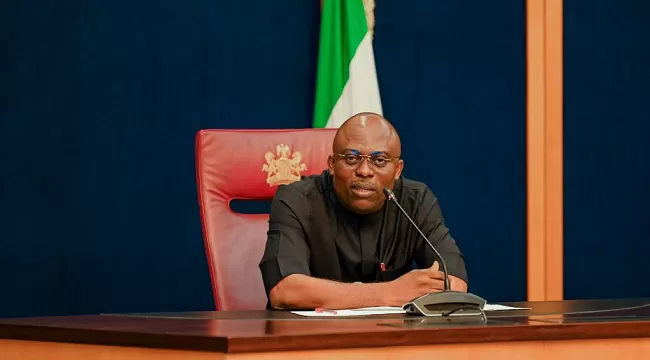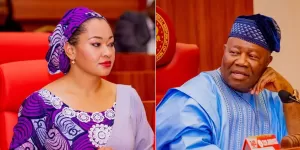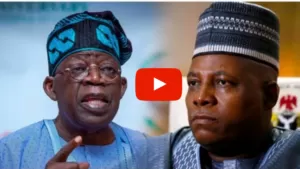Siminalayi Fubara’s Disinterest in Returning to Office: A Reflection on Rivers State’s Political Crisis

On May 11, 2025, during a solemn Service of Songs held in Port Harcourt to honor the late elder statesman Chief Edwin Kiagbodo Clark, suspended Governor of Rivers State, Siminalayi Fubara, made a poignant statement that has since reverberated across Nigeria’s political landscape. Speaking at the event, Fubara expressed a profound detachment from his former role, stating, “Can’t you see how better I look? Do you think I am interested in it? Do you even know if I want to go back there? My spirit has already left that place long ago.” His remarks, captured in posts on X and reported by various media outlets, underscored a personal resolve to distance himself from the ongoing political turmoil in Rivers State while urging attendees to focus on celebrating Clark’s legacy rather than stoking political tensions.
Context of the Crisis
Fubara’s comments come against the backdrop of a deepening political crisis in Rivers State, which culminated in his suspension, along with his deputy governor and the state legislature, by President Bola Tinubu on March 18, 2025. The president declared a state of emergency in the state, citing escalating unrest and the need to restore stability. In the wake of this decision, retired naval chief Ibok-Ete Ibas was appointed as the sole administrator to oversee the state’s affairs. The suspension followed months of political friction, primarily between Fubara and his predecessor, Nyesom Wike, now the Minister of the Federal Capital Territory, whose influence in Rivers State politics remains significant.
The crisis has been marked by violent clashes, including attacks on local government secretariats and the deaths of at least eight individuals, as well as injuries to dozens more. The state’s political instability has also led to the dissolution of elected local government councils, with caretaker committees appointed to replace them. These developments have polarized public opinion, with some residents and political actors calling for Fubara’s reinstatement, while others support the federal government’s intervention.
Fubara’s Remarks at the Service of Songs
The Service of Songs, organized to pay tribute to Edwin Clark—a revered Ijaw leader and advocate for Nigeria’s unity—drew a diverse crowd, including political figures, community leaders, and mourners. However, the event took a political turn when some speakers addressed Fubara as “Governor” and called for his return to office. Fubara, visibly uncomfortable with these remarks, used his speech to clarify his stance. He emphasized that such comments were personal opinions and cautioned against turning a memorial event into a platform for political agitation, which he argued could exacerbate tensions in the state.
Fubara’s statement, “Are you sure I even want to go back to the office again? My spirit has left there since,” was both introspective and symbolic. He pointed to his improved physical appearance and inner peace as evidence of his emotional liberation since his suspension. “Can’t you see how better I look?” he asked, suggesting that the burdens of the governorship had taken a toll on him, and his current state of suspension had paradoxically brought relief. His words resonated with many who interpreted them as a rejection of the power struggles that have defined Rivers State’s recent political history.
Public and Political Reactions
Fubara’s remarks sparked widespread discussion, particularly on social media platforms like X, where users highlighted his apparent disinterest in returning to office. Some praised his candor, viewing it as a rare moment of vulnerability from a public official, while others speculated about his future political plans. Supporters of Fubara argued that his statement reflected a principled stand against engaging in a destructive power struggle, while critics suggested it signaled a lack of commitment to resolving the state’s challenges.
The political implications of Fubara’s comments are significant. By publicly distancing himself from calls for reinstatement, he has positioned himself as a figure seeking to rise above the fray, potentially appealing to those who prioritize peace and reconciliation. However, his stance may also alienate supporters who view his return to office as essential to countering Wike’s influence and restoring democratic governance in the state.
Edwin Clark’s Legacy and the Call for Unity
Fubara’s insistence on focusing the event on Edwin Clark’s legacy was a deliberate attempt to redirect attention to the values of unity and service that Clark championed. As a former Federal Commissioner for Information and a prominent voice in Nigeria’s socio-political sphere, Clark was known for his advocacy for the Ijaw people and his efforts to promote national cohesion. Fubara described Clark as a “great man” whose life should inspire reflection rather than division.
In urging attendees to honor Clark’s memory by avoiding political rhetoric, Fubara aligned himself with the elder statesman’s principles. He advocated for a “strategic” approach to the ongoing crisis, hinting at a preference for dialogue and de-escalation over confrontation. This approach contrasts sharply with the aggressive posturing that has characterized much of the Rivers State crisis, including the reported destruction of government facilities and the violent clashes that prompted the state of emergency.
The Road Ahead for Rivers State
Fubara’s public disavowal of desperation to return to office raises questions about the future of governance in Rivers State. With Ibok-Ete Ibas serving as sole administrator, the state remains under federal control, and the timeline for restoring elected leadership is uncertain. The suspension of the state legislature and the dissolution of local government councils have further centralized power, prompting concerns about democratic backsliding.
For Fubara, the path forward appears to involve navigating a delicate balance. His comments suggest a personal recalibration, prioritizing his well-being and peace of mind over political ambition. Yet, as a key figure in Rivers State’s political landscape, his actions and statements will continue to shape public perceptions and influence the trajectory of the crisis.
Conclusion
Siminalayi Fubara’s remarks at the Service of Songs for Edwin Clark encapsulate a moment of personal and political significance. By declaring that his “spirit has left” the governorship, he has signaled a profound detachment from the office he once held, choosing instead to advocate for peace and reflection. His words, delivered in the shadow of Rivers State’s ongoing crisis, underscore the human cost of political conflict and the need for leadership that prioritizes unity over division.
As Rivers State grapples with its challenges, Fubara’s stance serves as a reminder of the complexities of governance in a polarized environment. Whether his approach will pave the way for reconciliation or further complicate the state’s political dynamics remains to be seen. For now, his message is clear: the pursuit of power must not come at the expense of peace, and the legacy of figures like Edwin Clark should inspire a higher standard of leadership.






